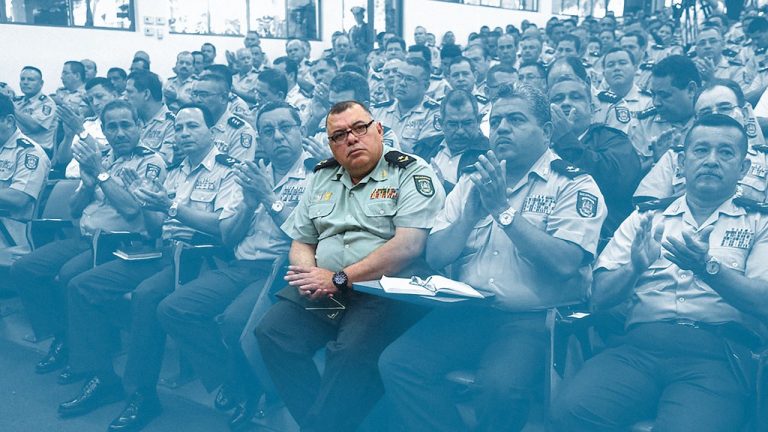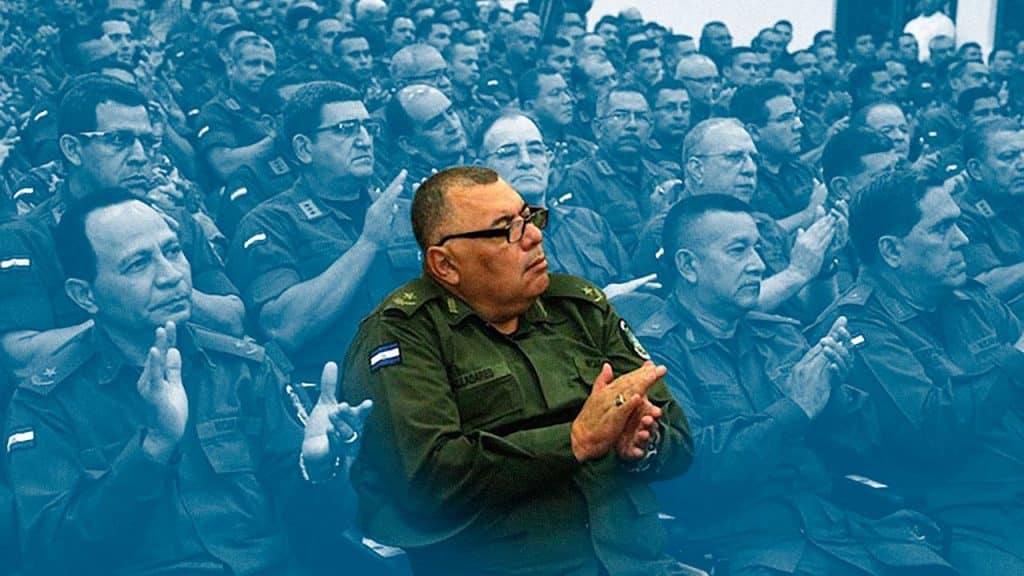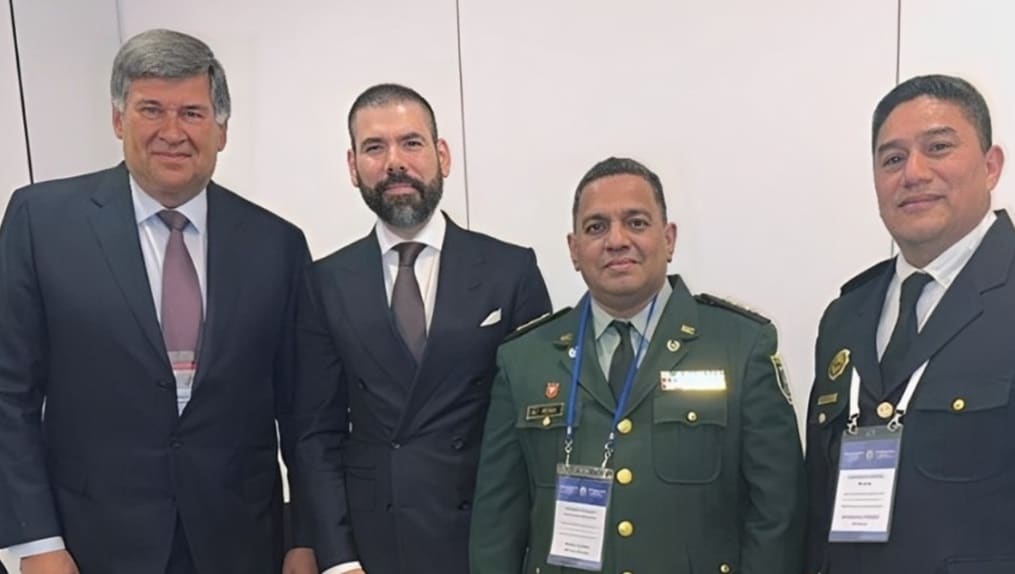20 de agosto 2024

Children of Exile: The Births “Sowing Hope” in the Camp of Nicaraguan Farmers

PUBLICIDAD 1M
PUBLICIDAD 4D
PUBLICIDAD 5D
Brigadier General Rigoberto Balladares, head of the Defense Information Directorate, will be replaced by his deputy, Colonel Alvaro Peña

Brigadier General Rigoberto Balladares Sandoval, head of the Directorate of Defense Information, during the delivery of the 2012 Annual Report of the Nicaraguan Army, in April 2013. // Photo: CCC
Brigadier General Rigoberto Balladares, who spent 14 years as head of the “Political Intelligence” body of the Nicaraguan Army - known as the Directorate of Defense Information (DID) - was removed from his post in July on the orders of Vice President Rosario Murillo, two sources linked to the Army confirmed to CONFIDENCIAL.
Murillo's order was transmitted to the Armed Forces through General Julio Cesar Aviles, head of the Army, who carried it out through the institutional channels of the Army Command. In June Balladares was temporarily suspended and an investigation was ordered. A month later he was definitively separated from his post.
However, the retirement of Rigoberto Balladares and the appointment of his replacement, the deputy chief of the DID, Colonel Alvaro Peña, have not yet been made official.
“Unless it is an extraordinary case, retirement orders of Army officers are usually announced in November, but changes are carried out according to the needs that the command defines,” explained one of the sources linked to the Army.
Brigadier General Rigoberto Balladares took over as head of the DID on March 3, 2010, three years after Ortega assumed his second presidential term. At that time, he held the rank of infantry colonel of ALEMI, Superior Military Studies. He was promoted to brigadier general on August 30, 2011, according to presidential agreement 179-2011, published in the Official Register La Gaceta six days later. His new rank was bestowed upon him on the 32nd anniversary of the Army, on September 2.
At the time of his dismissal, Balladares was one of the 21 generals who, together with General Aviles, make up the Army's “institutional plug”, which prevents promotions in the military career. He is the first high-ranking military officer to be removed from his post by the direct intervention of Vice President Murillo.
General Balladares, originally from San Miguelito in Río San Juan, was part of the FSLN guerrilla group created in the Solentiname archipelago in 1977, and he fought in the Southern Front under the command of the Spanish priest Gaspar Garcia Laviana.
Sources linked to Balladares describe him as a military man, “politically loyal to Daniel Ortega, not to Rosario Murillo.”Balladares developed his military career under the orders of Omar Halleslevens, the retired General who headed Army Counterintelligence and was Ortega's vice president for one term. Balladares also earned his law degree at the cancelled and confiscated Central American University (UCA). His file in the Supreme Court of Justice is Number 1089-2005.

As head of the DID, General Balladares represented the Armed Forces in the National Intelligence Commission, which includes the Police, the Army, the Ministry of the Interior and the Financial Analysis Unit.
“In this structure –which doesn't officially exist–, all intelligence information is analyzed and a daily report is drafted and prepared for Ortega. It is a sort of national security team,” explained Roberto Samcam, a retired major of the Nicaraguan Army.
Balladares was also a member of the Military Council, a consultative body to the head of the Army chief. The Council is composed of at least 40 brigadier generals, colonels and lieutenant colonels, heads of regional military units and army directorates.
The Sovereign Security Law empowered the DID to collect information on individuals and organizations considered “suspicious” because of their disagreement with the government or for being part of a partisan organization or social movement, according to an analysis done in 2015 by sociologist Elvira Cuadra, an expert on security issues.
Under Balladares' command, the DID was accused by human rights defenders, journalists and opposition leaders of carrying out “political espionage” activities, in violation of the Military Code, which establishes a strict prohibition of these activities by the Army.
During the 2018 civic rebellion, and especially in the months from April to September, the DID became the main source of information, intelligence, and political espionage on civic protest leaders in the territories, serving Ortega and Murillo's strategy of repression and its “Operation Cleanup,” carried out by the police and paramilitary forces.
An independent investigation, carried out by a Central American think tank at the request of a U.S. institution, concluded that the military, through the DID, participated in the repression of civic protests, which the dictatorship considered acts of “foreign interference,” according to the media outlet Expediente Publico (Public File in English).
In 2019, a video was leaked showing the former Minister of the Interior, Ana Isabel Morales, affirming that Army Intelligence “was working on the ground” against those considered opponents. The admission of the former official was made at an event with Sandinista party militants.
“General Balladares personally directed those actions to support the police and the paramilitaries who were being coordinated by Fidel Moreno, the FSLN organizational secretary. For Daniel Ortega that was an invaluable help,” said one of the sources linked to the Army. However, despite Ortega's support for Balladares, Murillo decided to remove Balladares from office for alleged non-compliance with an executive order.
Balladares will be replaced by Colonel Alvaro Peña, deputy chief of the DID. Over the last two years, Peña has been part of all the Nicaraguan delegations that have attended conferences or signed security agreements in Russia. Colonel Peña appears in several photographs in the company of Laureano Ortega Murillo, son of Daniel Ortega and Rosario Murillo, at official events held in Russian cities.

This article was published in Spanish in Confidencial and translated by our staff. To get the most relevant news from our English coverage delivered straight to your inbox, subscribe to The Dispatch.
PUBLICIDAD 3M
Confidencial es un diario digital nicaragüense, de formato multimedia, fundado por Carlos F. Chamorro en junio de 1996. Inició como un semanario impreso y hoy es un medio de referencia regional con información, análisis, entrevistas, perfiles, reportajes e investigaciones sobre Nicaragua, informando desde el exilio por la persecución política de la dictadura de Daniel Ortega y Rosario Murillo.
PUBLICIDAD 3D